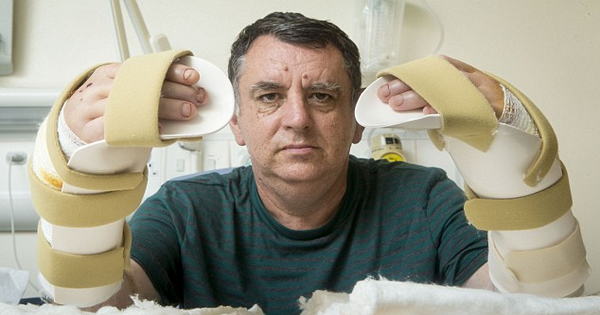Advertisement
57-year-old Chris King lost his hands in a freak accident at work involving a metal pressing machine. He still had his thumbs, but no longer had any of his fingers or knuckles.
Initially after the accident, King had resigned himself to adapting his lifestyle to fit his new hands. Some doctors had suggested he undergo reconstructive surgery, but he hesitated. “Something was telling me, no,” he admitted, “There’s something better out there.”

And King was right.
Not too long after he set aside the idea of reconstructive surgery, one of his doctors introduced him to the plastic surgeon Professor Simon Kay at Leeds General Infirmary. Back in 2012, Professor Kay had already performed a hand transplant on another patient and was willing to do a double transplant for King’s particular case.
King first met up with the previous patient – Mark Cahill – and the two exchanged stories. Cahill strongly encouraged King to have the surgery done, so King placed himself on a donor waiting list.
Not too long ago, King was matched with a donor and underwent surgery.
It was a huge success.
Although only a few days have passed, Professor Kay is feeling extremely positive about King’s outlook. King already has some movement in his hands, and they look, according to him, “absolutely tremendous.”
King will have to wait a while longer until he can take off his bandages, but he is already anticipating all the things he can begin doing again once he regains use of his new hands – namely cycling and holding his own beer to drink.
He is overwhelmed with gratitude for his donor – who would like to remain anonymous. “It’s marvelous,” King said of the experience. “It’s like someone putting an arm round you and saying you’ll be alright [sic]. It’s difficult to say thank you.”

Even with the most current medical technology, hand transplant surgery is incredibly long and complex. Many potential donors are also skeptical about donating because the physical appearance of a hand transplant is far more obvious than a more common organ transplant.
Professor Kay, however, remains hopeful that hand transplant surgeries will become more and more common in the future. “I think now hand transplant is a reality and people can see the good it does,” he said. “Successful transplants can significantly improve quality of life for patients.”
You can listen to Professor Kay talk about the surgery here:




